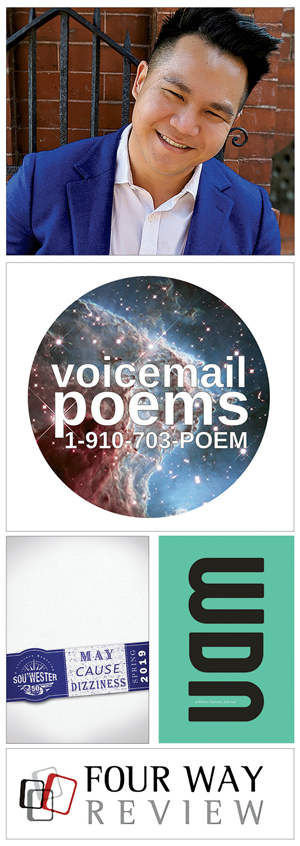The formally playful, register-mixing sensibility of Eric Tran’s debut, The Gutter Spread Guide to Prayer (Autumn House Press, February 2020), animates even the titles of such poems as “Regrets, in the Style of Clue,” “Portrait as Captain America Holding a Helicopter With a Bicep Curl,” and “Hermione Granger and the Reciprocal Erasure.” The book contends with, as Tran says, “the intersections of queerness, being Asian American, mental health, and their implications on desire, safety, and personhood.” Many of the poems also grieve the loss of a friend to suicide. “I learned to hold the grief // like an attic of heirlooms / and a single bulb // naked and waiting to be lit,” writes Tran. In addition to the five journals below, Tran has published poems in Juked, Figure 1, and Slice, among others.

Top: Eric Tran (Credit: Erik Donhowe)
Tran says he is drawn to journals with “poetry that makes me feel less alone or powerless.” He found this in wildness, an online quarterly of poetry, fiction, and nonfiction edited by Michelle Tudor and Peter Barnfather in Shropshire, England. “When I read an issue of wildness I’m prepared to be moved and surprised, bowled over by writers who are unafraid, or maybe afraid but still brave and capable, incisive and insightful,” says Tran, who notes that wildness has also published many of his favorite young Asian and Asian American writers. Tudor notes the journal seeks to be “an open and inclusive space, one that focuses on identity and personhood and how they inform and affect the environment we inhabit, be it externally or internally.” The journal is open for submissions year-round via e-mail.
In his poem “Pulse,” Tran reckons with the 2016 shooting at the Orlando, Florida, nightclub, writing “Breath // a scream spun in reverse / and Lord we holler // wet down each other’s / necks.” Tran, who recalls it was one of his first times writing about current events in his poetry, says he felt apprehensive trying to publish the piece but found the right editor in Ross White of Four Way Review. “I was gripped by the way Eric was able to entwine the sensual pleasures of dancing with the violence of the shooting,” says White. “We want writing that showcases the imagination’s unique ability to refine the raw materials of human experience.” In collaboration with the indie New York press Four Way Books, the online journal releases two full issues of fiction and poetry a year in addition to monthly mini-issues. White says David Schwartz just started as fiction editor and is looking to publish more flash fiction. Submissions are open year-round.
Tran also found editors he could trust in Eloisa Amezcua and torrin a. greathouse of the Shallow Ends, an online poetry journal. “They are fierce advocates for writers of color and queer writers,” says Tran, “so publishing a poem about queer grief and lust with them made me feel like I was in compassionate and capable hands.” Amezcua recalls meeting Tran in summer 2014. “He introduced himself as someone who wrote primarily nonfiction,” she says. “But after reading a few of his pieces, I knew he was writing unlineated poems. So when I made a list of writers to solicit for the journal, Eric was at the top of that list. His writing moved me.” Amezcua says that is her editorial goal—to find work that moves their readers. She and greathouse run one poem a week and have published pieces by Derrick Austin, Zefyr Lisowski, and Nate Marshall, among many others. Submissions are open year-round.
“I see them as a journal that publishes vulnerable writing that has attitude, that will wink at you and then blow an air hankie,” says Tran of the print annual Sou’wester, in which he published two X-Men-inspired poems he wrote after the shooting at Pulse, “Lectio Divina: Emma Frost” and “Days After Orlando I Read the X-Men.” Under the tagline “writing against the wind,” Sou’wester has published poetry and prose for more than fifty years. The journal is edited at Southern Illinois University in Edwardsville; managing editor and prose editor Valerie Vogrin says she and poetry editor Joshua Kryah are looking to collaborate more with the grad students of the university’s MFA program, which opened in 2018. Journal submissions will open via Submittable in late summer.
The online quarterly Voicemail Poems has a unique submission process—writers submit the text of an original poem to the journal’s website and then call in to 910-703-POEM and record that same poem as a voice mail. The editors then publish a selection of the poems alongside their recordings in the issue. “It’s a delight hearing the poets’ nervousness and excitement when introducing themselves paired with their confident and assured readings,” says Tran. He says that practicing reading his poem “My Mother Asks How I Was Gay Before Sleeping With a Man” to submit to Voicemail Poems helped him revise the piece, which he now often opens with at his readings. The latest issue of Voicemail Poems features work from Daria-Ann Martineau, Caits Meissner, and bail racine. Submissions are open year-round.
Dana Isokawa is the senior editor of Poets & Writers Magazine.








